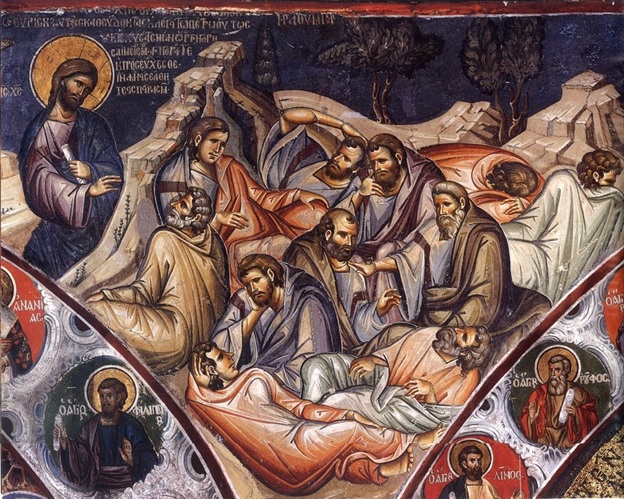Wednesday before Palm Sunday
13 April 2022Having strengthened by the power of the cross my mind weakened by wicked attacks, direct me to your will, Lord.
Raise me, Christ, who am sleeping on the bed of pleasures, slumbering in sloth, and show me to be a venerator of your Passion.
Having burnished our souls with fasting, let us, now cleansed, hasten to Jerusalem to meet Christ, who is coming in the flesh. (Matins, ode 1 [3]).

This first ode of the canon for the day (again written by Saint Iosif the Hymnographer) continues the contrast which is almost always present in the hymns of our Church: on the one hand, awareness of human weakness, which is due both to the evil one, who never ceases to wage war against the faithful and also to the slothfulness caused by the passions, which binds us to pleasures; and on the other our recourse to ‘the only one who can save’, the Lord. He looks upon the intercessions of his servants and leads them to his holy will, raises them so that they can be with him as fellow-travelers, and venerators of his Passion.
There are two given requirements for this redemptive relationship between Christ and the faithful. The first is Christ’s love for his creatures, the Cross and his Passion being constant confirmation of the truth of this. Secondly, is our own desire, as people, to be with the Lord- our supplication that he will help us. And the struggle of bodily and spiritual fasting, which cleanses the soul, is proof on our part of this truth. The crucial point in this relationship with the Lord, of course, is our request that he align our will with his: ‘direct me to your will’. This is because the hymnographer saint knew full well that the only obstacle in the way of our relationship with God is always our own will. According to the desert fathers, ‘the will is the copper wall which prevents us from seeing God’. The struggle with our egotism, with ‘because that’s what I want’, is a continuation of the sin of Adam and Eve. Our progress towards sanctity is made by subjecting our will to that of the Lord. The saints are people who have decided with all the strength of their soul to make the will of God their own personal will. As did the Lord, as a human person, in the Garden of Gethsemane: ‘nevertheless, not as I will, Father, but as you do’. This choice, which really is painful, because we have to navigate the dangerous straits of our egotism, demonstrates that we don’t yet mean it when we say the ‘Our Father’.
pgdorbas.blogspot.com






